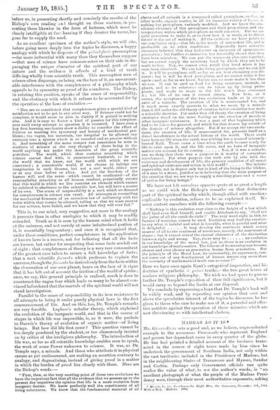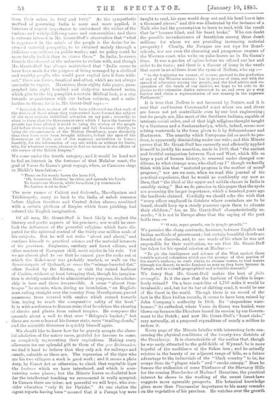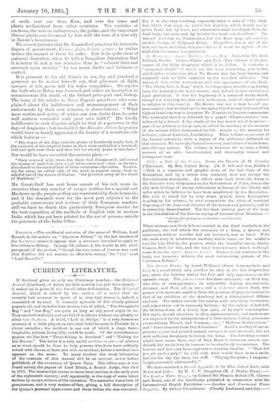MADRAS AS IT IS.• Mn. Gs tNT-DL Fr sets a
good and, as we believe, unprecedented example to the numerous Proconsuls who represent England and govern her dependant races in every quarter of the globe. He has had printed a detailed account of the business transacted in the course of eight tours made by him since he undertook the government of Southern India, not only within the vast territories included in the Presidency of Madras, but in the neighbouring States of Travancore and Mysore, Sandur and Cochin. Perhaps only Government officials can quite realise the value of what, to use the author's words, is " an excellent photograph of what the people of the Madras Presidency were, through their most authoritative exponents, asking from their rulers in 1682 and 1833." As the sympathetic method of governing India is more and more applied, it becomes of urgent importance to understand the wishes of the various and widely-differing races and communities; and there is extreme interest in Mr. Grant-Duffs observation that "what is upperamA in the minds of the people is the desire for in-creased material prosperity, to be obtained mainly through a judicious expenditure on public works; and no policy could be more fatally 11)olish than to starve these." In India, however, there is the clement of the unknown to reckon with, and though Mr. Grant-Duff has always maintained that "India seems to have been made for the purpose of being managed by a civilised and wealthy people, who would pour capital into it from without," there are force;, fanatical and other, which are not always amenable to rupees. Meantime, these eighty folio pages, paragraphed into eight hundred and sixty-five numbered notes, which give to the big pamphlet a certain Biblical look, is a step towards acquaintance with our Indian subjects, and a satisfaction to them ; for it is, Mr. Grant-Duff says :—
" Intended, first, to show all who have addressed me that each of the wishes of those whom they represented have formed the subject .of the must anxious individual attention on my pert ; secondly, to show to them that the Government over which 1 have the honour to preside has done all that it could to bring the wishes of the people laid before them through me, to rapid and full fruition ; thirdly, to bring the circumstances of the 3ladras Presidency, more distinctly than they have ever been brought hitherto, before the eyes of the Government of India and of the supreme authorities at home ; fourthly, for the information of any one within or without its limits, who, for whatever reason, chances to feel an interest in the affairs of this corner of the British Empire."
We come under the fourth category, and it would be hard not
to feel an interest in the fortunes of that Malabar coast, the -goal of Vasco da Gama's great voyage, when, as Camoens sings in Mickle's translation,— "Prone on his manly knees the hero fell, ' Oh, bounteous Heaven,' he cries, and spreads his hands To bounteous Heaven, while boundless joy commands No farther word to flow."
The mere names of Calicut and Golconda, Masulipatam and
.Trichinopoly, carry us back to the India of nabob romance before Afghan frontiers and Central Asian alarms, combined
with a certain plethora of Empire which fears pricking, had -sobered the English imagination.
Of all men, Mr. Grant-Duff is least likely to neglect the literary and poetic aspects of his province ; nor would he overlook the influences of the powerful religions which have dis puted for the spiritual control of the thirty-one million souls of his subjects. But he will not write " about and about," and confines himself to practical science and the material interests of his province. Engiueers, sanitary and forest officers, and other masters of European skill, must rejoice in his rule. Yet we are almost glad to see that he cannot pass the rocks out of -which the Koh-i-noor was probably washed, or walk on the flower-carpets of Quilandi, or cross the " mirage-haunted flat," -often flooded by the Kistna, or visit the ruined harbour of Cochin, without at least betraying that, though his imagination is strictly controlled to administrative purposes, his scholarship is here and there irrepressible. A scene " almost Dan tesque" he records, when, during an inundation, " an Englishman sailing straight over the country from 3Iasulipatam, passed numerous trees covered with snakes which craned towards him, trying to reach the comparative safety of the boat."
It is with a reference to Roman ruins that he advises the clearing of shrubs and plants from ruined temples. He compares the °quarrels about a well to that over " Bologna's bucket ;" but these are mere echoes of his former state, mere "trailing clouds," and the scientific Governor is quickly himself again.
We should like to know how far he gravely accepts the cheerful adulation of the native races, grateful for favours to come, as completely representing their aspirations. Making every -allowance for our splendid gift to them of the pmt Britannica, we find it hard to believe that they only ask for railways and canals, valuable as these are. The repression of the tiger who ate his two villagers a week is good work ; and it seems a plain duty, by Forest Act or otherwise, to check that vegetable tiger the faulona which we have introduced, and which is overrunning some places; but the Minute leaves us doubtful how far the intellectual teaching we recommend is really accepted.
In Canara there are tribes, not powerful we will hope, who conaider education " only fit for Pariahs." At one station the agent reports having been " assured that if a Paraga boy were taught to read, his eyes would drop out and his head burst into a thousand pieces;" and this was illustrated by the instance of a Naik who had the presumption to learn to read, with the result that he " became blind, and his heart broke." Who can doubt the possible recrudescences of fanaticism among these dumb millions for whom we are providing increasing material prosperity ? Clearly, the Paragas are not ripe for Board schools, nor are even the charming and prosperous swarms of the Western coast, who write on palm-leaves as in Da Gama's time. It was a garden of spices before we offered our law and order to its races ; and there is a flavour of irony in the words that occur in an address from the ryots of Nellore, who say :—
"In the beginning we cannot, of course, pretend to the perfection of any of the Western nations ; but iu process of time, and with the spread of education among the people, and the kind advice and cooperation of the heads of our district, we hope to be able to do justice to the extensive duties entrusted to us, and even go a step further and claim a representation of our country in the supreme Parliament."
It is true that Nellore is not favoured by Nature, and it is
near that surf-beaten Coromandel coast where sea and rivers are forces not yet controllable even by our best engineering ; but its people are, like most of the Southern Indians, capable of intricate social order, and of that high religious thought taught by a Gautatna and a Sankarachariya,, which, indeed, seems now setting westwards in the form given to it by Schopenhauer and Hartmann. The anarchy which Europeans did so much to produce, is apparently diminishing under our rule; and this Minute proves that Mr. Grant-Duff has earnestly and efficiently applied himself to justify his assertion, made in 18t19, that "the ancient and fruitful antagonism between East and West, which fills so large a part of human history, is renewed under changed conditions, to what strange uses, who shall say ?" though we hardly think with him that "material progress is the mother of moral progress ;" nor are we sure, when we read this journal of his practical experience, that he would as confidently say now as then, that " the ideal of the upper and middle classes in India is sensibly rising." But we do perceive in this paper that the ryots are assuming the larger importance, which a hundred years ago the landlords claimed. Cordially we should echo the wish that " every officer employed in. districts where zemindars are to be found, should keep up a steady pressure upon them to educate their children ;" for, as Mr. Grant-Duff characteristically remarks, " it is not in Europe alone that the saying of the poet holds true :
"' 0 rois, soycz grands, car le peuple grandit.'"
We perceive the sharp contrasts, however, between English and Indian methods of government ; but certain beautiful chords are founded on discords, and, to use words of his when be was not responsible for their verification, we see that Mr. Grant-Duff has taken for his special mission at Madras :
"To pit the intelligence and science of the West against those terrible natural calamities which are the scourge of that portion of the earth's surface; to curb rivers, to cleanse towns, to lead waters through the desert, to make famines as rare as they have become in Europe, and to extend geographical and scientific research."
We fancy that Mr. Grant-Duff makes the best of faits accomplis. Is it the case that the harbour of Cochin is hopelessly ruined ? On a bare coast-line of 1,760 miles it would be invaluable; and,bat for its bar of shifting sand, it would be one of the finest in the world. Though there is no record of the fact in the East Indian records, it seems to have been ruined by John Company's authority in 1806. Its " stupendous warehouses," its cathedral, where Vasco da. Gama was buried, were blown-up because the Directors feared its cession by our Government to the Dutch ; and now Mr. Grant-Duff's " heart sinks," very naturally, at a proposed expenditure of nearly a million to restore it.
Every page of the Minute bristles with interesting facts con cerning the physical conditions of the twenty-two districts of the Presidency. It is characteristic of the author that, though ho was early attracted to the gold-fields of Wynaad, he is more hopeful of the usefulness of the Salem iron ; and he actually rejoices in the beauty of an adjacent range of hills, as a future advantage to the industrials of the " black country " to be, for escape from its " plague winds " and " smoke canopy." Does he foresee the utilisation of some Thirlmere of the Shevaroy Hills for the coming Manchester of Madras ? Meantime, the practical interest be shows in the working of the recent forest-laws suggests more agreeable prospects. His botanical knowledge gives more than Proconsular importance to his many remarks on the vegetation of his province. He watches over the growth of seeds sent out from Kew, and over the trees and plants acclimatised from other countries. The varieties of cinchona, the various rubber-trees, the palms, and the important fibrous plants, are discussed by him with the tone of a true ally in Nature's beneficence.
We cannot perceive that Mr. Grant-Duff practises his favourite
dogma of government, Lairstr iaisser passer ; he rather
invites the contact of those he rules. Nor is he quite clear of paternal despotism, when he tells a Bangalore deputation that it is better to risk a few mistakes than to "exhaust time and encroach upon eternity " by too many cheeks and balances of control.
It is pleasant to his old friends to see, dry and practical a governor as he makes himself out, that glimmers of light, savours of salt, prove still his wider sympathies. He repairs the bath where Heber was drowned, and orders an inscription to
commemorate the death of the Oxford prize-poet and bishop. The irony of his rebuke to those Pagoda guardians who complained about the indifference and mismanagement of their endowments by their own votaries, is characteristic. "What more motive and spring of action can you desire than to order well matters connected with your own faith ?" His kindly indifference to such disputes might be that of a governor in the days of Augustus ; but we doubt if the Hercules Atlicus he praises would have so keenly appreciated the beauty of a mountain-side which looks as :— " The slopes of the Alps over the plains of Lombardy might look, if the contents of the tropical house at Kew were multiplied a hundredfold and spilt over them and then left for twenty years to interlace."
Nor would be have recorded the curious plain :— "Once covered with trees, but these bad disappeared, and round the stump of each had risen a tall white-ant's nest—now, iu its turn, abandoned to the natural heir of these creatures—the cobra. Stretching far away, on either side of the road, in regular array, they reminded me of the stones of Comae.' the petrified army on the heath of Morbilian.' "
Mr. Grant-Duff has sent home annals of his rule more in structive than any number of essays written for a special end. He shows us the people as they are represented by their demands; and if the demands were for the most part adjusted to the probable concessions and notions of their European masters, still we have to thank this particularly European master for the best exposition of the methods of English rule in modern India which has yet been printed for the use of persons outside the precincts of the India Office.
ERRATUM.—The accidental omission of the name of William, Lord Russell, in the article on "Algernon Sidney," in the last number of the Spectator, makes it appear that a sentence intended to apply to him refers to Sidney. In page 18, column 2, the words in the sixth paragraph of the review, "though his nice sense of honour was such that Baril!on did not venture to offer him money," for " his," read " Lord Russell's."








































 Previous page
Previous page